Are Gerbils Easy to Take Care of
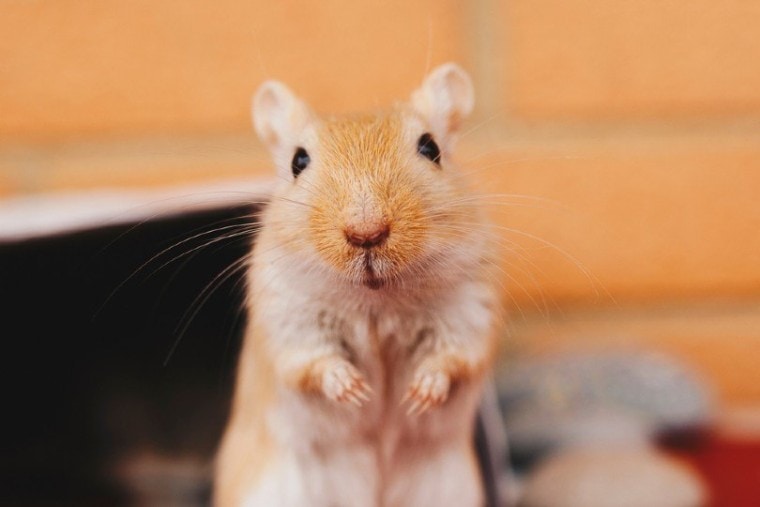
Whether you've just brought a brand-new gerbil home or you're thinking about it, you want to know what you're getting yourself into. Rest assured, gerbils are easy to care for and can be quite fun to have around. As lovers of tubes and little exercise balls, you can get your gerbil moving around his enclosure or your house (with supervision), as well as in your hand or on your shoulder if you train him well.
So, let's start talking about the ins and outs of owning and taking care of gerbils.

Gerbil Facts
An average gerbil grows to be about 4 inches long, with a 4-inch-long tail. They come in many colors, the most common one being golden agouti, but also white, blue, lilac, and grey, with different patterns as well. Gerbils live for up to 4 years.
The gerbil originates from and lives wild in China, Mongolia, and Russia. They were first mentioned in history in 1866 when Father Armand David, a missionary priest and zoologist, sent the gerbils he found in Northern China back to a French museum to be named and documented. They did not become popular as pets until 1954 when a cluster of gerbils was brought to the United States for scientific reasons. Mostly all pet gerbils today descend from this group.
Gerbils differ from other rodents in many ways. Their tails are longer than hamsters, and the tails have more hair on them than a rat or mouse. Gerbils have longer noses and are longer in general than hamsters, and gerbils' legs have the capability of standing, while hamsters do not. When it comes to sociability, gerbils are social creatures that do better with a cage mate than a hamster, which can live alone.
Do Gerbils Make Good Pets?
These tiny creatures make good pets for people who want something furrier and more sociable than a mouse or rat and less high-maintenance than a guinea pig. They don't have a lot of needs and can be left for a weekend when provided enough food and water. When they are used to human interaction at a young age, they make great pets and they rarely bite.
Gerbils are sometimes active during the day, and they are active at night, too. They make the best pets for adults and older children; younger children who have not learned the best handling practices might accidentally harm a pet gerbil.
- See Also: Do Gerbils Bite? All You Need To Know!
Where Can I Get a Gerbil?
Gerbils can be purchased at big pet stores like Petco or PetSmart. You can also try looking in your local pet adoption agency or animal shelter, as small rodents can sometimes be available here. It's also worth checking internet listings like Facebook Marketplace or Craigslist.
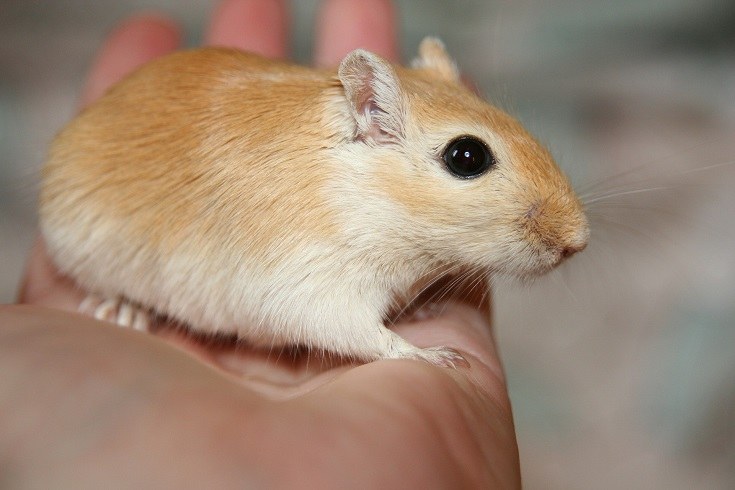
How Much Does It Cost To Own a Gerbil?
One gerbil costs around $5 to $10. That is not the expensive part. You will spend around an additional $100 on a cage and on outfitting the cage with toys. For food, gerbils will eat about $15 or so of food and treats per month, and your gerbil tank will need about $10 of bedding every month. For veterinary visits per year, you will probably spend between $35 and $60 dollars.
That means your initial cost of buying everything you need for a gerbil can cost anywhere from $90 on the low end to $200 on the high end, and the monthly costs of owning a gerbil are about $40, minus vet visits.
- See also: How Much Does It Cost to Own a Gerbil? (Updated in 2021)
What Kind of Home Does My Gerbil Need?
Gerbils need a habitat that's at least one cubic foot large (12 inches wide, 12 inches deep, 12 inches tall). This cage can be either a wire or an aquarium tank. If you opt for an aquarium tank, make sure it's at least 10 gallons and has a wire mesh top that's secure. Line the bottom of the tank or cage with 1–2 inches of bedding that's safe for gerbils. Do not use pine or cedar shavings as these off-gas materials that are toxic to gerbils.
In addition to a cage, you will also need to provide your gerbil with a food dish and a water bottle. Provide your gerbil something to chew on as well; they need something somewhat hard and abrasive to chew on to keep their teeth filed down. This could be an untreated piece of wood, a stick from outside, or even a dog biscuit, but your local pet store is likely to have something gerbil-specific.
To enrich the life of your gerbil, make sure there are multiple levels in the cage for your gerbil to explore. An exercise wheel is ideal too, as well as a little hiding box or igloo for your gerbil to sleep in or escape into when he desires. Gerbils also love to play in cardboard tubes or PVC pipes, so if you have any extras, you can put them in your gerbil habitat. Your gerbil will appreciate it!
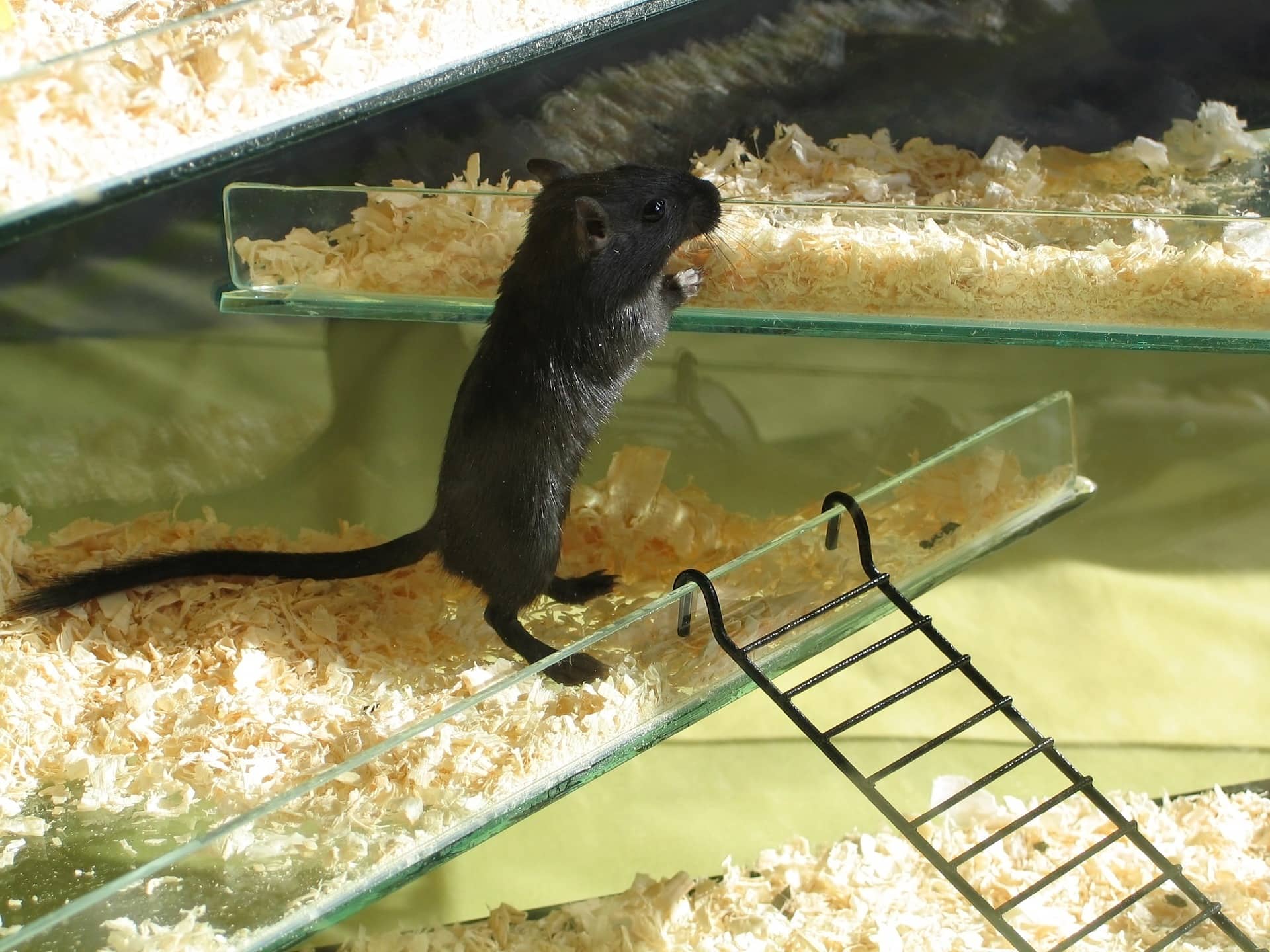
What Should I Feed My Gerbil?
Gerbils usually do fine with a gerbil pellet/seed mixture. It should contain around 12% protein content and around 7% fat content. Look for the gerbil food to have a mix of pellets, grains, dried veggies, and seeds.
In addition to store-bought food, you can give your gerbil fresh veggies and fruit. Fresh veggies and fruits that your gerbil will love include carrot, lettuce, peas, broccoli, mango, kiwi, pineapple, and banana. To keep a watch on food allergies, introduce these foods one at a time, and wait a few days before introducing a new food.
Do not feed your gerbil cabbage, uncooked beans, chocolate, onions, candy, or junk food.
You should provide your gerbil with fresh water all the time, and change the water daily if you can. The best way to give your gerbil water is to attach an inverted bottle to the cage, where your gerbil can drink freely by licking the metal ball at the end, allowing water to come out.

How Do I Take Care of My Gerbil?
Feeding
Fill your gerbil's food bowl with the pellet/seed gerbil food about ¼ full every day. On top of that, give your gerbil a small amount of fresh food. One teaspoon of a fruit or veggie is plenty, and it should only be given to your gerbil twice a week, according to Glenway Animal Hospital.
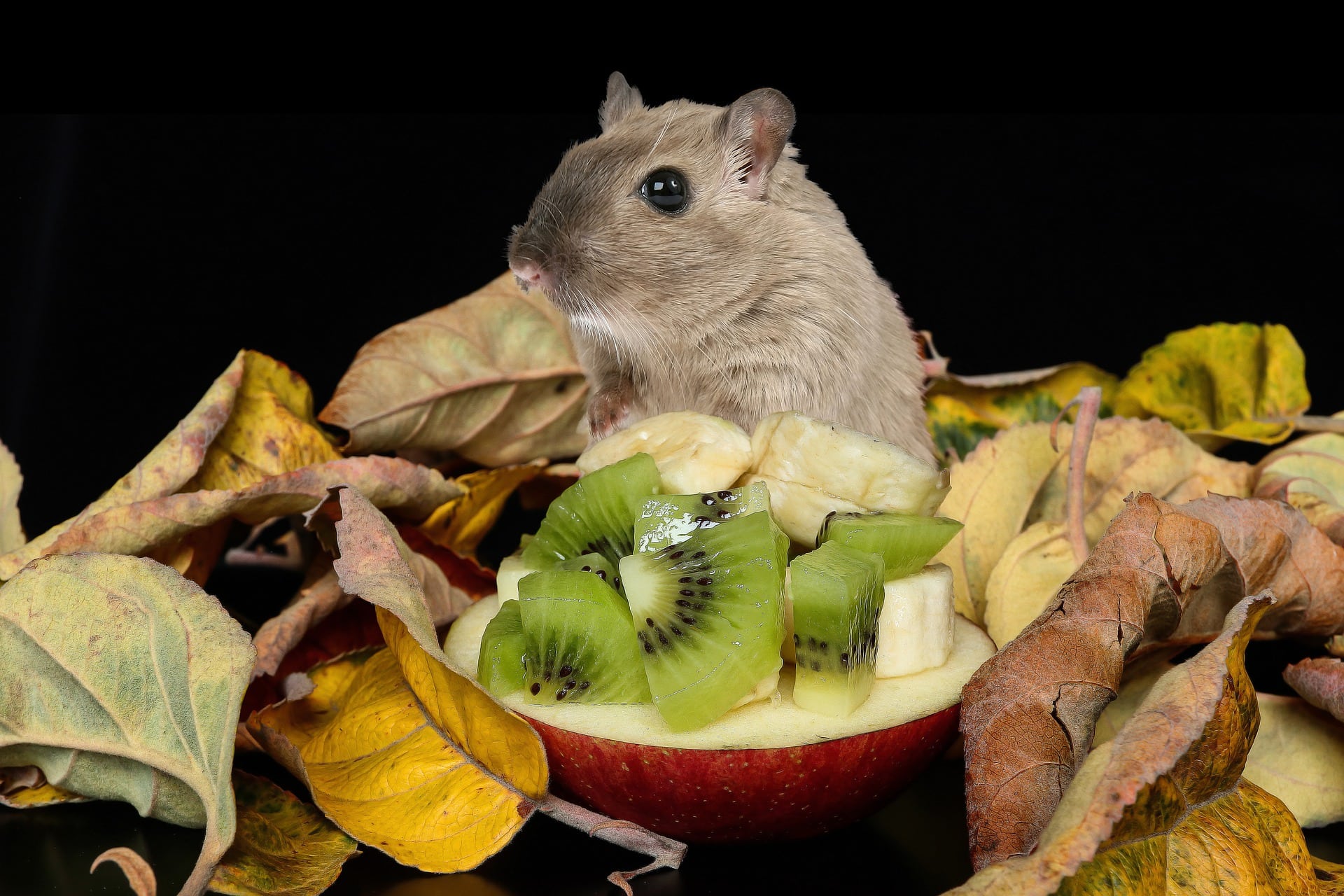
Handling
Your gerbil might be quite timid at first. When you introduce them to their new home, leave them be for 3 to 4 days as they need time to adjust to their surroundings. After this time, try offering them some food from your hand. Once they get comfortable here, you can try to pick them up. You can do this by scooping them up into your hand. You should never pick a gerbil up by its tail or grab onto the tail in any way, as it could cause injury.
Cage Cleaning
Gerbils stay cleaner than other rodents, but they still need some help cleaning their cage. Remove any soiled bedding as soon as you notice it. The bedding should be completely changed at least once a month, but more like twice a month for two or more gerbils. Check the hide houses regularly and clean them out, too.
Every 3 to 4 weeks, disinfect the gerbil cage or aquarium. Wash the food dish and water bottle when they get dirty, too.
Cage Location
The cage should be kept indoors in a room that stays between 65℉ and 75℉. Do not put the cage in direct sunlight, and keep the cage away from other animals that might disturb the gerbil. If the gerbils' nocturnal behavior bothers you, keep their cage out of your bedroom.
Exercise
Once you've got your gerbil hand-trained, you can take them out of their cage for exercise. 20 minutes a day is a good place to start. Keep an eye on them during this time, and make sure the enclosure is escape-proof. You could try putting them in a ball to run around the house too, just make sure they are on the floor and not in danger of getting stepped on or falling down the stairs. It's also a good idea to make sure other pets are caged up or outside.
Gerbils do very well with the company of other gerbils. A same-sex pair living together is an ideal situation.
Grooming
Gerbils are great at cleaning themselves, but to help them naturally do that, give your gerbil access to some sand. These natural desert creatures will use the sand to get rid of any bacteria sticking on their coat. To do this, get a dish more than ½ inch deep, fill it with chinchilla sand (not dust) ½-inch full. Put the sand bath in the tank for 10 minutes once a week, and your gerbil should take care of the rest.
If you have noticed that your gerbil's nails have curled too much or started to grow back towards their feet, you will have to help them by trimming them up.
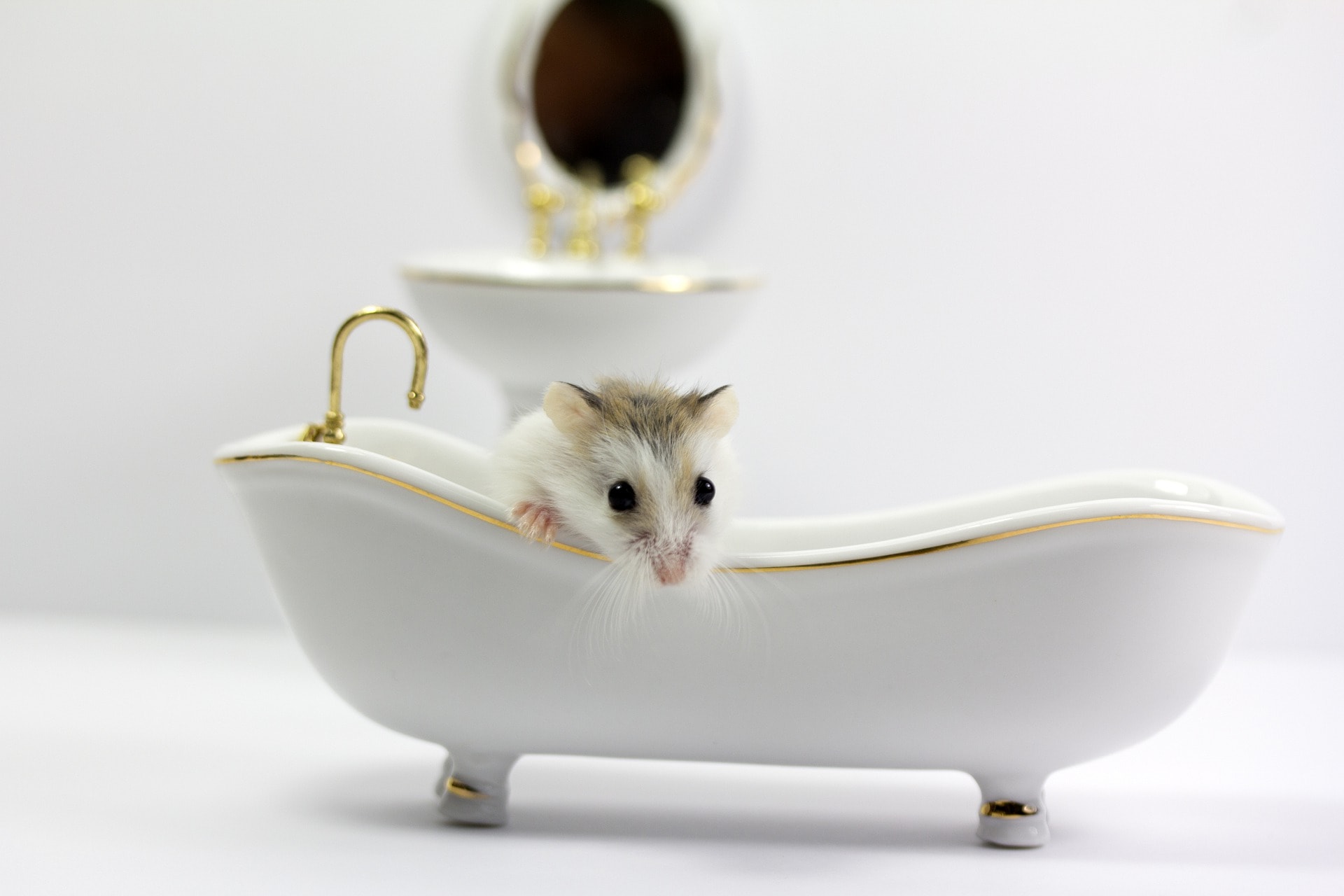
How Do I Know If My Gerbil Is Sick?
When your gerbil shows these adverse health symptoms, be sure to contact your vet right away:
- Difficulty breathing
- Sneezing
- Discharge from the eyes, nose, or mouth
- Sunken, swollen, or cloudy eyes
- Weight loss
- Overgrown front teeth
- Lethargy
- Diarrhea
- Signs of fleas or lice
Here are a few other illnesses that are common among gerbils and what they look like.
Tyzzer's Disease
Tyzzer's disease is a bacterial infection in the gut. The symptoms are diarrhea, tiredness, pain, a posture that doesn't look normal, untidy hair, and dehydration. This condition can be fatal if vet care is not immediately sought out.
Tail Loss
A gerbil's tail is quite vulnerable to injury if not handled properly. Commonly, the tuft around the tail and skin can be pulled completely off, just leaving the bone. As unsightly as this is, this problem will usually resolve itself by the tail drying out and coming off after a few days. As gerbils are omnivores, they may even eat their own tail off in this case. Don't be too alarmed, once this process is finished, the gerbil hardly notices the loss.
If, however, the entire tail comes off in a traumatic accident, you should get your gerbil examined by a vet to make sure no other damage has been done.
Fits
Sometimes gerbils go into fits, most likely due to stressful situations. This can happen when the gerbil has been handled too much, the surroundings have changed, when it senses nearby "predators" (like dogs or cats), and too much activity and noise around the habitat.
A gerbil fit looks like this: ears folded back, twitching, and sometimes drooling. When you see these signs, remove any stressors right away. Your gerbil should calm back down and return to normal.
Fits are more common in younger gerbils who are not yet acclimated to their surroundings.

Conclusion
Keeping all this in mind, remember that gerbils are extremely tiny creatures that need to be handled with care. Unfortunately, accidents can happen very easily with a rodent this small. Be gentle and you and your gerbil will have many good times together. Also, don't forget to wash your hands after handling a gerbil as they can carry diseases that could make you sick.
- You may also be interested in: Where to Buy a Gerbil? (Plus an Overview of the Best Places)
Featured Image Credit: Sildf, Shutterstock
whitworthmusinare.blogspot.com
Source: https://petkeen.com/how-to-take-care-of-a-gerbil/
0 Response to "Are Gerbils Easy to Take Care of"
Post a Comment